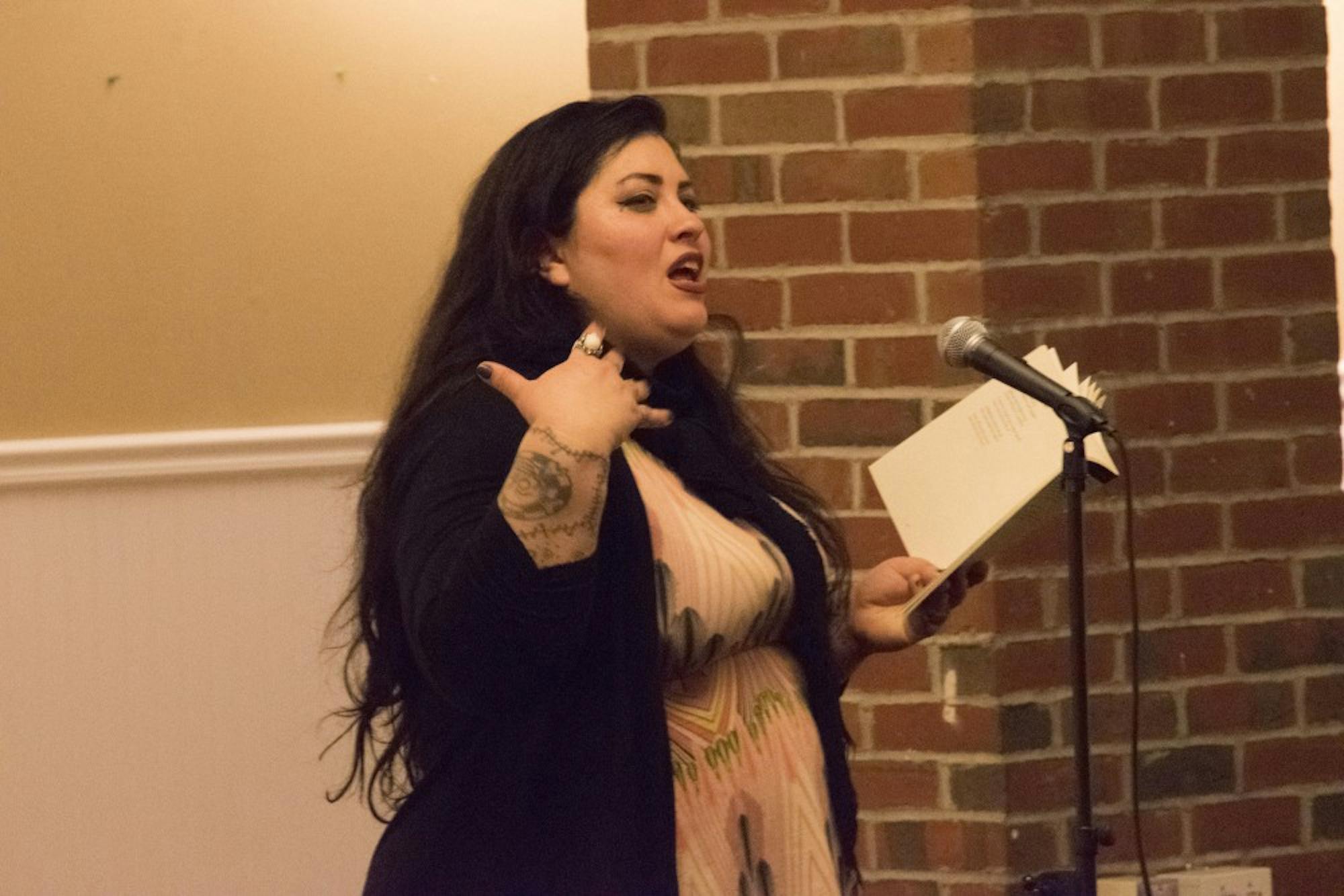In a performance entitled “Trigger Warning” on Tuesday night in Brace Commons, powerful poetry duo Mother Tongue made one thing clear from the beginning: They will not remain in the margins. These poets — Rachel McKibbens, 2009 Women of the World Poetry Slam champion, and Dominique Christina, twice a winner of the same contest — aren’t performers who beat around the bush. They come at the bush head-on, with equal parts confidence and vulnerability.
Mother Tongue performed their spoken-word poetry as part of a three-day residency sponsored by the women’s, gender and sexuality studies department. In addition to three public events this week, the poets visited four different classes and attended organized discussion-based lunches and dinners with students.
Women’s, gender and sexuality studies professor and published poet Giavanna Munafo said she and professor Francine A’ness, a lecturer in the women’s, gender and sexuality studies department, began working to establish the residency last year in response to demand from students.
The artists introduced their residency in a mission statement.
“We believe in interrupting narrow spaces,” Christina and McKibbens wrote in promotional materials. “We believe in introducing students to the wider function of language and art as activism.”
A small but enthusiastic audience filled every seat in Brace Commons to hear Christina and McKibbens grapple with violence and marginalization. One student asked how the artists work with the deep-seated history of colonialism inscribed within the English language. Christina responded that historically, black and brown bodies were violently forced to speak the English language, but not allowed to read it — in this way, according to Christina, “colonization weaponized English.”
Soul Scribe members Raven Johnson ’18, and Skyler Kuczaboski ’21, opened for Mother Tongue. Rachel McKibbens followed the introduction with her poems, first providing the personal history behind each. She spoke about her childhood, both in her poetry and introductions. In one poem she described herself as a “kindergartener with a sweet tooth for death,” a “child standing at the mouth of the underworld” who “never wanted to stay dead, [she] just wanted a better, sweeter life.”
McKibbens was a powerful speaker, a rhythmic poet and a person who suffered unimaginable trauma. Her poetry is visceral, personal, dark and at times very funny. It not only reveals her soul but turns her skin inside out. She bares blood, makes the audience witness to a topographical map of her historical body.
Christina concluded by performing a wide range of her poetry. Dealing with dark and important material, she was laugh-out-loud funny, empowering and a beautiful singer. She too described her childhood and her “storied body.” A piece entitled “The Right Kind of Slutty,” began with a disclaimer to her Catholic mother before answering her daughter’s question of “how many men there were” with something “out of Game of Thrones: legions.” Christina asks her daughter in a poem to name her menstrual blood “something biblical.” This is important work that moves and inspires. It’s work whose words spoken aloud sink into the skin to rest, make a rash and cause revolution within their host.
The duo also touched on how to navigate queerness in languages like Spanish or Italian, which operate on a gender binary. The language should fit the body, Mother Tongue argued, not the other way around.
“English sits alongside violence…[and] as an African American, my relationship to the English language is alchemical, because it had to filter through so many ways of knowing,” Christina said.
Poetry, at times, has been a survival strategy for the duo.
“My relationship with the spoken word has a lot to do with growing up in a culture of silence, and specifically, we couldn’t survive if we didn’t have language as this amazing bridge towards moving out of our traumatized bodies and into a place within ourselves that is empowered and strengthened and willing to breach those codes of silence,” McKibbens said.
Ultimately, Mother Tongue asserted that their work is an act of reclamation, an act of reclaiming and utilizing a language in a way that it was not intended to be used.
The words certainly made an impression on the audience.
“The performance was incredible, considering how a poem can take you through a range of emotions, that you can listen to people discuss trauma and in the same poem be laughing and cheering,” audience member Katie Carithers ’20 said. “It is incredible that Mother Tongue deals with such heavy subject material while at the same time uplifting their own voices and the voices of others.”




